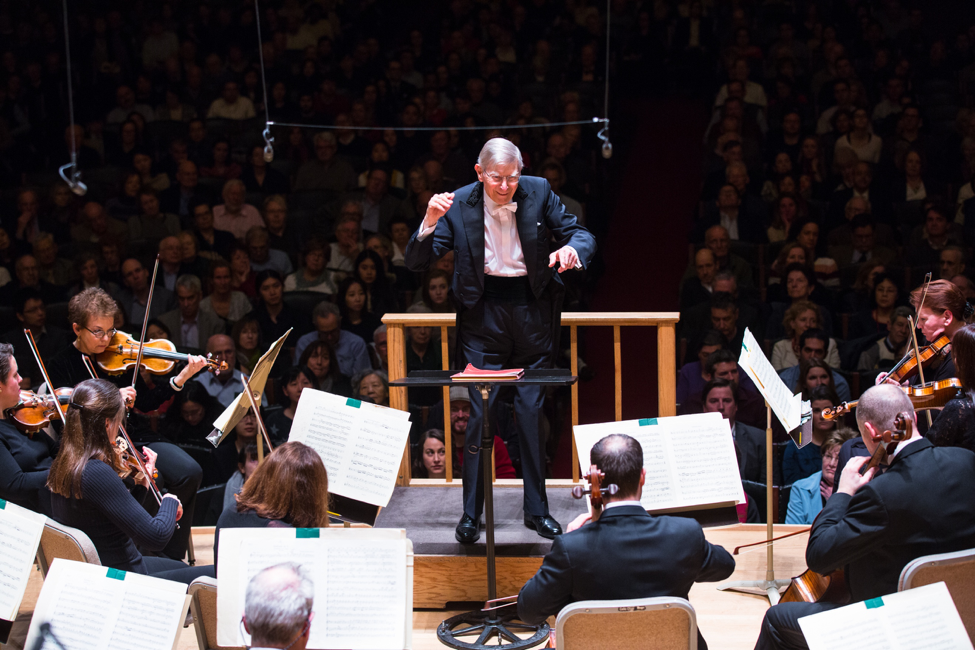Mozart Never Dies: The Boston Symphony Orchestra’s February 22 All-Mozart Program

Photo credit: Robert Torres, courtesy of Boston Symphony Orchestra.
Classical Director Pablo Rasmussen attended the February BSO All-Mozart performance at Symphony Hall, where Herbert Blomstedt led the orchestra through Mozart’s Symphonies No. 34, No. 36 “Linz”, and No. 41 “Jupiter”.
I believe classical music performances are about the balance of the audience's expectations and the conductor's vision. A conductor can decide to innovate so much upon a composition that they repel any audience trying to appreciate what they think is the composer’s intent. Or the conductor can have such an un-innovative approach that the audience becomes ambivalent. Striking that balance is incredibly difficult for any piece, but well-known pieces by well-known conductors pose a particular challenge.
The stage was set for a challenging performance with the Boston Symphony Orchestra on February 22 (with additional performances February 23, 24, and 27). The orchestra was led by guest conductor Herbert Blomstedt, who is still making his mark on the classical music world at 90 years old. The challenge ahead of him seemed to be nothing more than another concert for the conductor. To him, Mozart’s 34th, 36th, and 41st Symphonies were merely old partners in a long relationship with music and the orchestra a trustworthy body to perform them. My question was whether they would innovate or perform the most conservative form of these well-known symphonies. The result was so far from the mundane as Blomstedt and the Boston Symphony Orchestra reminded me of why these are “classics” in every sense of the word.
The start of the three C major symphonies was the restrained, yet interesting, Symphony No. 34. Composed before leaving Salzburg, it reflects a period of change and growing maturity for the 24-year old Mozart. Despite its slightly less-known themes, it is especially alluring as a small, both with smaller instrumentation and only three movements, and almost intimate piece—if a symphony can be called intimate. It is reminiscent of one of Mozart’s Horn Concertos rather than an often-showy Mozart Symphony. Blomstedt did not attempt to overcompensate for the restrained nature of the symphony, but rather, kept the pace quick and spirited as if showing the hall that the energetic and shorter piece had as much to say as the others. He kept an eager orchestra at bay and reminded them of the subtle balance at play. His restraint was the opposite of simple conservatism, it is the masterful control of a genre and piece so familiar to him.
Mozart, with all the mythos surrounding his life, can reliably make any member of an audience feel incompetent. His Symphony No. 36 was composed in the span of four days during a trip to the city of Linz, where the symphony gets its nickname. Blomstedt did not restrain the ability of Mozart, himself, or the orchestra to remind us that we are mere humans among musical gods. The last symphony, No. 41 “Jupiter”, only continued the evocations of grandeur of the previous symphony. The strings unleashed their strength in the first movement, reminding me that the Jupiter of the symphony is not only the mythological figure, but one embodied by the orchestra and felt by the audience.
Blomstedt’s confidence and joy at the beginning of the concert seemed so obvious by the end of it; he channeled the energy of a demanding orchestra and produced incredible renditions of well-known Mozart symphonies. By saving their energy for the last two symphonies, he ensured the audience would be enthralled by every familiar note as if they were hearing it for the first time. I have listened to Mozart’s symphonies since I was a few years old, but last Thursday I heard completely different pieces. They were in the moment and rendered through emotion and power, rather than through innovation for innovation’s sake. The BSO reminded me that these warhorses are famous because they are good and because each performance is different than the last; it reminded me that Mozart never dies.
Pablo Rasmussen is a Classical Director and Producer. Join him for his feature “The Periphery” Wednesday evenings 7-8 pm.